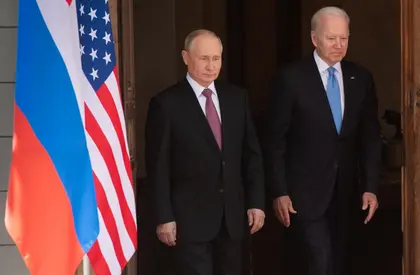Putin's widely advertised Feb. 21, 2022 state of the nation address to the Federal Assembly left very many observers disappointed. Apart from the usual bunch of propagandistic clichés and primitive anti-Ukrainian and anti-Western rhetoric, the suspension of participation in the Russia-U.S. Strategic Arms Reduction Treaty (New START) on limiting Russian and U.S. strategic offensive weapons was the only noteworthy message he conveyed.
What's behind it?
JOIN US ON TELEGRAM
Follow our coverage of the war on the @Kyivpost_official.
Just as a reminder, the Russia-U.S. Treaty on Measures for the Further Reduction and Limitation of Strategic Offensive Arms (New START, or START III) is a bilateral agreement on further mutual reduction and limitation of deployed strategic nuclear weapons. Under the treaty, the parties agreed to reduce the number of their respective deployed nuclear warheads to 1,550 and their ground-, sea-, and air-launched intercontinental ballistic missiles to 700.
The treaty was signed in Prague on April 8, 2010 by then Russian President, Dmitry Medvedev and US President Barack Obama. Taking effect on Feb 5, 2011, it replaced START I (which expired in December, 2009) and the May 24, 2002 Strategic Offensive Reductions Treaty (aka the Moscow Treaty). The new 10-year treaty was extendable for five years upon mutual agreement.
Interestingly, the treaty was criticized by Russia's notorious politician Vladimir Zhirinovsky and some Republican congressmen. The expert community criticized its bilateral nature; it’s not applying to China's or other third countries' nuclear arsenals.

US Must Address Russian Disinformation to Strengthen US Election Integrity
Donald Trump, who took office in 2017, claimed START III favored Russia and even called it "unilateral". His administration insisted that either a new treaty that includes Chine be concluded or that START III be extended to include new types of strategic and tactical nuclear weapons and additional verification mechanisms. Talks dragged on until Trump's presidential term expired. No decision was made on extending the treaty.
During U.S.-Russian talks on strategic stability in 2020, Washington invited China to partake in START negotiations. Beijing stated its readiness to join trilateral talks, but only if Washington agreed to reduce its nuclear arsenal to China's level. Eventually, the U.S. abandoned the idea of including China in the START talks.
START III was to expire on January 26, 2021. On Feb. 4, 2021, Vladimir Putin and Joe Biden held a phone call during which it was agreed the treaty would be extended by five years. The relevant notes were exchanged between the two states. The next day, Russia's Duma and Federation Council ratified the agreement on extending START III. Putin signed the law on the prolongation of the treaty on January 29, 2021. The U.S.-Russia START III agreement extension took effect on February 3, 2021.
Washington and Moscow managed to prolong the treaty quickly and easily despite the fact that Joe Biden's presidency has just started and Russia was already amassing troops along Ukraine's borders. The explanation for the swift cooperation is simple: the treaty met the security interests of both Parties i.e., keeping ballpark parity between their strategic nuclear capacities.
Now, Putin suddenly suspends Russia's participation in the treaty. Why?
The most logical answer is Putin's nuclear blackmail.
It should be noted that the blackmail pertaining to START preceded Putin’s made the announcement. On Nov. 29, 2022, Russian Foreign Ministry spokeswoman Maria Zakharova announced Russia was putting off START talks with the U.S. as a result of the U.S. decision to supply weapons to Ukraine. On Jan. 30, 2023, Deputy Foreign Minister Sergey Ryabkov announced START might not be prolonged after February, 2026. All this leads to the possibility to conclude the Russia's decision to suspend its participation in the treaty had been prepared beforehand. Pressure on Washington began to mount back last year, when Russia invaded Ukraine.
Importantly, Russia is not withdrawing from START but merely suspending its participation. This means Putin is still ready to negotiate, but necessarily on strategic offensive arms. His bargain entails an end to the war in Ukraine on his conditions. Otherwise, he would not have announced the suspension in his speech dealing with his war against Ukraine.
His announcement is in line with his typical political style: he threatens and blackmails on the one hand and offers a bargain on the other. By way of blackmail he tries to force the other party to accept his conditions.
This negotiating tactic has failed him many times before, and his attempt to put pressure using START is likely to fail too. The Kremlin's blackmail does not work anymore and Russia is not in any position to dictate its own terms.
The views expressed in this opinion article are the author’s and not necessarily those of Kyiv Post.
You can also highlight the text and press Ctrl + Enter






